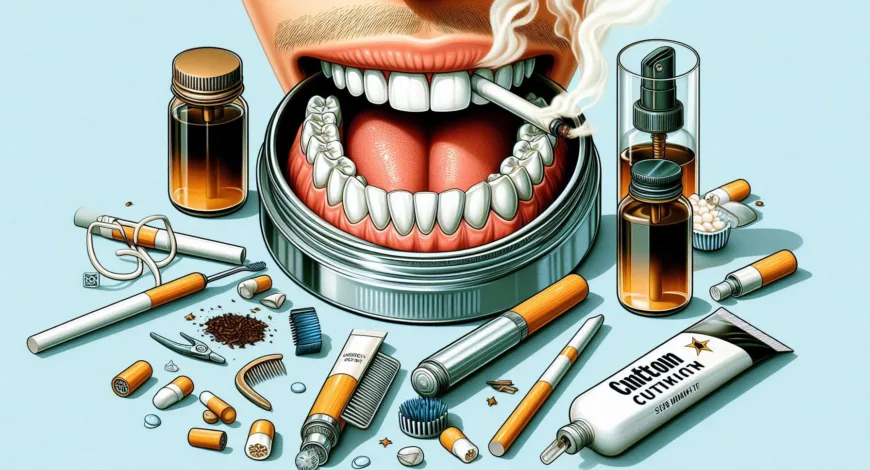Nicotine stains on teeth are a common concern for smokers, leaving their smile looking yellow or even brown over time. Nicotine, found in tobacco products like cigarettes, can not only discolor your teeth but also damage your overall oral health. While quitting smoking is the most effective way to prevent further staining, there are several methods you can use to remove existing nicotine stains and restore the natural whiteness of your teeth.
In this comprehensive guide, we’ll explore effective ways to remove nicotine stains from teeth, why they form, and how you can maintain a healthier, brighter smile.
✅ What Are Nicotine Stains? 🤔
Nicotine stains are a form of dental discoloration caused by the tar and nicotine in tobacco products. These stains typically start as yellowish marks on the teeth but can become darker and more stubborn over time. Nicotine itself is colorless, but it interacts with oxygen in the mouth, which leads to the formation of yellow or brownish stains on your teeth.
When you smoke or use tobacco, the chemicals in the smoke or smokeless tobacco products cling to the surface of your teeth, causing stains. These stains are not only unsightly but can also lead to plaque buildup, which can further damage your enamel and contribute to gum disease.
✅ Why Do Nicotine Stains Appear on Teeth? 🧐
Nicotine stains are primarily caused by the following factors:
1. Chemical Reaction with Saliva 💨
When nicotine enters the mouth, it reacts with the proteins and bacteria present in your saliva. This reaction causes a yellow or brownish residue to form on the enamel, which leads to visible stains.
2. Tobacco Particles 🍂
Cigarette smoke contains tar, which is sticky and can cling to the teeth’s enamel. Over time, the tar particles accumulate on the teeth, causing discoloration.
3. Plaque and Tartar Formation 🦷
Nicotine stains often go hand-in-hand with plaque buildup. Plaque is a sticky film of bacteria that forms on the teeth and can lead to tartar if not cleaned properly. Tartar can further contribute to staining and make it more difficult to remove nicotine stains.
4. Enamel Damage 🦷
Tobacco products can wear down your tooth enamel over time. When enamel becomes weaker, the underlying dentin, which is naturally yellow, becomes more visible, enhancing the appearance of nicotine stains.
✅ How to Remove Nicotine Stains from Teeth? 🦷
While professional cleaning by a dentist can effectively remove stubborn nicotine stains, there are also several at-home remedies and dental treatments that can help you restore your smile.
1. Brush Regularly with Whitening Toothpaste 🪥
Using a high-quality whitening toothpaste that’s specifically formulated to remove stains can be an effective way to reduce nicotine discoloration. Whitening toothpastes contain mild abrasives that gently scrub away surface stains and help prevent further staining.
-
How to use: Brush your teeth twice a day with a whitening toothpaste, making sure to use a soft-bristled toothbrush to avoid damaging your enamel.
Why it works: The abrasive nature of the toothpaste helps to scrub away the tar and nicotine from the surface of the teeth, while ingredients like baking soda and hydrogen peroxide help break down stains.
2. Professional Teeth Cleaning 🦷
If you have stubborn nicotine stains, visiting a dentist for a professional cleaning is one of the most effective ways to remove them. Dentists use specialized tools to clean your teeth, remove plaque, tartar, and surface stains, and restore the natural color of your enamel.
-
How it works: The dentist uses an ultrasonic scaler or manual tools to gently remove tartar and plaque buildup from the surface of your teeth. This process is followed by polishing to smooth out any remaining stains.
Why it works: Professional cleaning not only removes nicotine stains but also prevents future staining by cleaning hard-to-reach areas where plaque and bacteria can accumulate.
3. Whitening Treatments 🦷
Whitening treatments, both at-home and professional, are designed to target deeper stains caused by nicotine. These treatments typically use bleaching agents like hydrogen peroxide to break down stains and whiten the teeth.
-
At-home options: Whitening strips, gels, and trays that contain hydrogen peroxide or carbamide peroxide can be used at home. Apply them according to the instructions for the best results.
-
Professional whitening: Dentists offer in-office teeth whitening treatments, which use stronger bleaching agents and special light to speed up the whitening process.
Why it works: These treatments use bleaching agents to penetrate the enamel and lift deep stains, offering significant results in a short amount of time.
4. Oil Pulling with Coconut Oil 🛢️
Oil pulling is an ancient oral hygiene practice that involves swishing oil around in the mouth to remove bacteria and plaque. Coconut oil, in particular, is known for its antibacterial properties and can help improve the appearance of nicotine-stained teeth.
-
How to use: Swish a tablespoon of coconut oil around your mouth for 10–15 minutes, making sure to reach all areas of your teeth. Spit out the oil and rinse your mouth with water.
Why it works: Coconut oil helps to remove plaque and bacteria, which can reduce nicotine stains. Additionally, it helps to whiten teeth naturally without harsh chemicals.
5. Baking Soda Paste 🍚
Baking soda is a common household item that can be used as a natural abrasive to remove surface stains. It works by gently scrubbing the surface of the teeth and helping to lift stains.
-
How to use: Mix a small amount of baking soda with water to create a paste. Apply the paste to your toothbrush and gently brush your teeth for 2–3 minutes.
Why it works: The mild abrasiveness of baking soda helps remove stains while also neutralizing acids in the mouth that can contribute to enamel erosion.
6. Maintain Proper Oral Hygiene 🦷
Brushing your teeth properly at least twice a day, flossing daily, and using mouthwash can help prevent the buildup of nicotine stains. Regular cleaning removes plaque and food particles that could contribute to staining and keeps your teeth healthy.
Why it works: Proper oral hygiene removes plaque and bacteria that can cause stains, helping prevent nicotine buildup on your teeth.
✅ How Can Dent Ally Help with Nicotine Stains? ⭐
At Dent Ally, we specialize in professional dental treatments that can help you remove nicotine stains and restore the natural whiteness of your teeth. Here’s how we can assist you:
1. Expert Whitening Services 🦷
We offer both in-office and take-home teeth whitening treatments designed to tackle even the toughest nicotine stains. Our professional whitening treatments are safe, effective, and tailored to your needs.
2. Customized Cleaning Plans 🧑⚕️
Our skilled dental team offers professional cleaning services to remove tartar, plaque, and surface stains caused by nicotine. We tailor each treatment to address your specific oral health needs and help prevent future staining.
3. Comprehensive Oral Care 🦷
At Dent Ally, we don’t just focus on whitening teeth—we emphasize long-term oral health. Our team provides personalized care, including regular checkups, deep cleanings, and maintenance to keep your smile bright and healthy.
✅ Frequently Asked Questions (FAQs) About Removing Nicotine Stains ❓
-
How long does it take to remove nicotine stains?
Removing nicotine stains can take time, depending on the severity. With professional whitening, noticeable results can appear within one visit. At-home treatments can take a few weeks for gradual improvement. -
Can I completely remove nicotine stains from my teeth?
In most cases, nicotine stains can be significantly reduced or removed with the right treatment. However, if the stains have deeply penetrated the enamel, professional treatments may be required. -
Are there any risks with whitening treatments?
Professional whitening treatments are generally safe when performed by a dentist. However, some people may experience tooth sensitivity after whitening. It’s important to consult a dentist to determine the best treatment for your teeth. -
Does smoking affect the results of teeth whitening?
Yes, smoking can cause rapid re-staining of your teeth after whitening treatments. To maintain results, it’s best to quit smoking and follow a good oral hygiene routine.
Conclusion: How to Remove Nicotine Stains from Teeth 🦷
Nicotine stains can be stubborn, but with the right treatment and proper care, you can restore your smile. From professional cleaning and whitening treatments to at-home remedies like baking soda and oil pulling, there are several options to help you remove nicotine stains and achieve a brighter smile.
If you’re dealing with nicotine stains and want professional care, reach out to Dent Ally for expert whitening treatments and comprehensive oral health solutions. We are here to help you get your smile back to its natural, beautiful state! 😁

